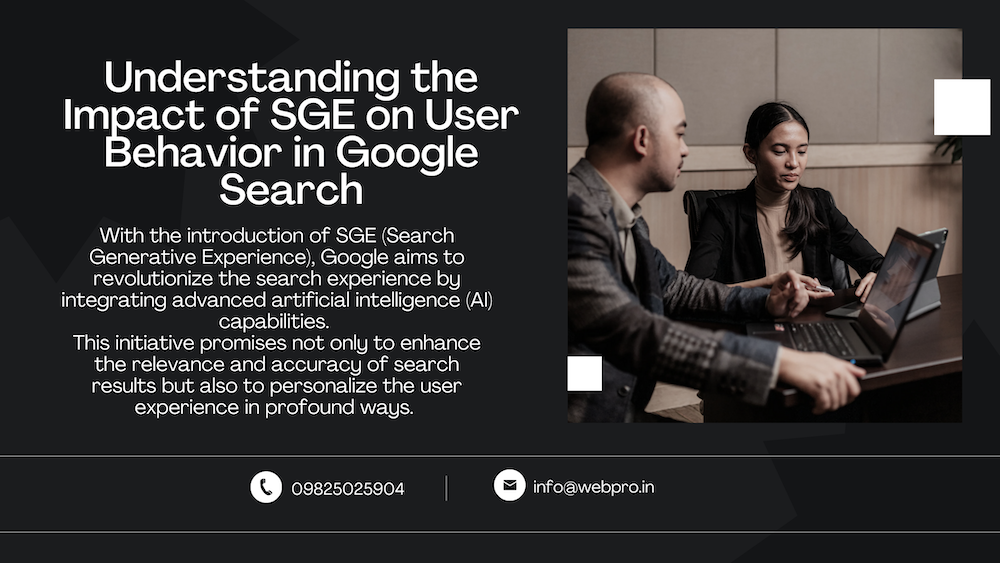In the ever-evolving landscape of digital information retrieval, Google has consistently been at the forefront of innovation. With the introduction of SGE (Search Generative Experience), Google aims to revolutionize the search experience by integrating advanced artificial intelligence (AI) capabilities. This initiative promises not only to enhance the relevance and accuracy of search results but also to personalize the user experience in profound ways. In this detailed analysis, we delve into the potential impacts of SGE on user behavior, exploring how these advancements may reshape how individuals seek information, make decisions, and interact with digital content.
- Shift Towards More Complex Queries and Natural Language
One of the most noticeable impacts of SGE on user behavior is likely to be a shift towards more complex queries expressed in natural language. Traditionally, search engines relied heavily on keyword matching, requiring users to distill their queries into fragmented terms. However, with SGE's enhanced AI capabilities, Google can now understand and interpret the nuances of natural language queries more effectively.
This advancement encourages users to ask more detailed and nuanced questions, confident that the search engine can comprehend their intent accurately. Instead of simple searches like "best restaurants," users may now input queries such as "What are the highest-rated Italian restaurants near me that offer gluten-free options?" This evolution in query complexity allows users to receive more precise and contextually relevant results, catering to their specific preferences and requirements.
- Increased Expectation for Personalization
SGE marks a significant leap forward in personalizing the search experience. By leveraging AI to analyze user behavior, search history, and contextual data, Google can create tailored search results that cater to individual preferences and interests. This personalized approach not only enhances user satisfaction by delivering more relevant information but also fosters a sense of recognition and engagement.
Users are likely to develop heightened expectations for personalized content across their interactions with Google. Whether searching for news updates, shopping recommendations, or travel destinations, users may come to expect that their search experiences seamlessly adapt to their unique contexts and interests. This personalized touch not only saves time for users but also enhances the overall search experience by minimizing irrelevant information and enhancing the likelihood of discovering new interests or opportunities.
- Greater Reliance on Voice Search and Hands-Free Interaction
With advancements in voice recognition and natural language understanding, SGE is poised to accelerate the adoption of voice search among users. Voice search offers a convenient and intuitive way for individuals to interact with technology, particularly in settings where hands-free interaction is preferred or necessary (e.g., while driving or multitasking).
SGE's enhancements in voice search capabilities enable Google to interpret natural language commands more accurately and respond with relevant information or actions. Users can now engage with Google through voice queries that mirror everyday conversation, such as asking for weather updates, navigation directions, or restaurant recommendations. This shift towards voice-based interactions not only enhances accessibility for users with disabilities but also reflects a broader cultural acceptance of verbal communication with technology.
As users become more accustomed to the convenience and responsiveness of voice search powered by SGE, they may increasingly rely on voice commands for a variety of tasks beyond traditional web searches. This trend towards voice-driven interaction underscores Google's commitment to making search more accessible, intuitive, and integrated into users' daily lives.
- Deeper Engagement with Rich Media and Interactive Content
SGE introduces new dimensions of interactivity and engagement within search results through the integration of AI-driven enhancements. Google can enrich search outcomes with multimedia content, interactive elements, and immersive experiences that captivate and inform users in novel ways.
For example, a search for a historical landmark might yield virtual tours or 360-degree panoramic views, allowing users to explore destinations as if they were physically present. Similarly, product searches can incorporate interactive demos or augmented reality (AR) experiences, enabling users to visualize products in their real-world environment before making purchase decisions.
This integration of rich media not only enhances the informational value of search results but also prolongs user interaction with content, fostering a more immersive and satisfying experience. By providing users with engaging multimedia and interactive elements, SGE encourages deeper exploration and discovery, transforming traditional search interactions into dynamic and educational experiences.
- Increased Trust in Search Results and AI Recommendations
As SGE enhances the accuracy and relevance of search results through AI-powered algorithms, users are likely to develop greater trust in the information presented. The ability of AI to analyze vast datasets, interpret user intent, and refine recommendations over time can instill confidence in users that they are accessing credible and reliable information.
This trust in AI-driven recommendations extends beyond search results to influence user decisions in various domains. For instance, personalized product recommendations based on user preferences and past behavior can guide purchasing decisions with greater confidence. Moreover, AI-powered insights into travel recommendations, healthcare information, or educational resources can empower users to make informed choices that align with their individual needs and preferences.
By leveraging AI to curate and personalize search experiences, Google not only enhances user satisfaction but also reinforces its position as a trusted source of information and recommendations. As users increasingly rely on AI-driven insights and recommendations provided by SGE, they are likely to perceive Google as a valuable ally in navigating the complexities of digital information and decision-making.
- Expectation for Instantaneous and Predictive Responses
SGE's optimization of search operations for speed and efficiency can shape user behavior by fostering an expectation for instantaneous and predictive responses. Users accustomed to rapid access to information may become less tolerant of delays or inefficiencies in search performance.
SGE's predictive capabilities enable Google to anticipate user needs and proactively offer relevant information or actions based on user behavior and situational context. For example, predictive search suggestions, real-time updates on breaking news, or personalized notifications can streamline information retrieval and enhance user engagement.
This proactive approach not only saves time for users but also enhances the overall search experience by minimizing the need for repetitive queries or manual navigation. By delivering timely and predictive responses, SGE empowers users to stay informed, make timely decisions, and engage more effectively with digital content.
- Influence on Consumer Behavior and Decision-Making
The personalized and context-aware nature of SGE can exert a significant influence on consumer behavior and decision-making processes. By delivering tailored recommendations, personalized offers, and relevant content based on user preferences, Google empowers users to make informed choices across various domains.
For instance, personalized product recommendations can guide purchasing decisions by highlighting options that align with individual preferences, budget constraints, or specific requirements. Similarly, travel recommendations based on past preferences and location data can inspire users to explore new destinations or plan immersive experiences.
SGE's integration of rich media and interactive content within search results enhances the informational value of product searches, educational inquiries, or lifestyle recommendations. By providing users with immersive experiences, visual demonstrations, or virtual previews, Google facilitates confident decision-making and fosters deeper engagement with digital content.
- Evolving Expectations for Privacy and Ethical AI Use
As Google advances its AI capabilities through SGE, users may develop heightened expectations regarding data privacy, transparency, and ethical AI practices. Concerns about data security, algorithmic bias, and the responsible use of personal information are likely to influence user behavior, prompting individuals to seek assurances from Google regarding their data protection measures and ethical guidelines.
Google's commitment to safeguarding user privacy and promoting ethical AI practices is essential in building and maintaining trust among users. By upholding stringent data protection standards, providing transparency in AI decision-making processes, and implementing user-centric privacy controls, Google can mitigate concerns related to data security and algorithmic fairness.
By prioritizing ethical AI development and deployment, Google not only enhances user confidence but also sets a precedent for responsible innovation in digital technology. As users become more informed and discerning about privacy considerations and ethical AI practices, their trust in Google's commitment to user welfare and data integrity strengthens.
Conclusion
In conclusion, SGE represents a pivotal milestone in the evolution of Google search, ushering in a new era of intelligent, personalized, and immersive search experiences. By leveraging advanced AI capabilities to enhance relevance, accuracy, and user engagement, Google is poised to redefine how individuals interact with digital information and make decisions in the digital age.
As SGE continues to evolve and expand its capabilities, the impact on user behavior will be profound, shaping expectations for personalized content, voice interactions, interactive experiences, and predictive insights. By embracing these advancements responsibly and ethically, Google can empower users to navigate the complexities of digital information with confidence, curiosity, and trust.
By fostering a future where search becomes not only a tool for information retrieval but a gateway to personalized knowledge, exploration, and discovery, Google demonstrates its commitment to enhancing the user experience and redefining the possibilities of AI-driven innovation in search.
June 26, 2024






